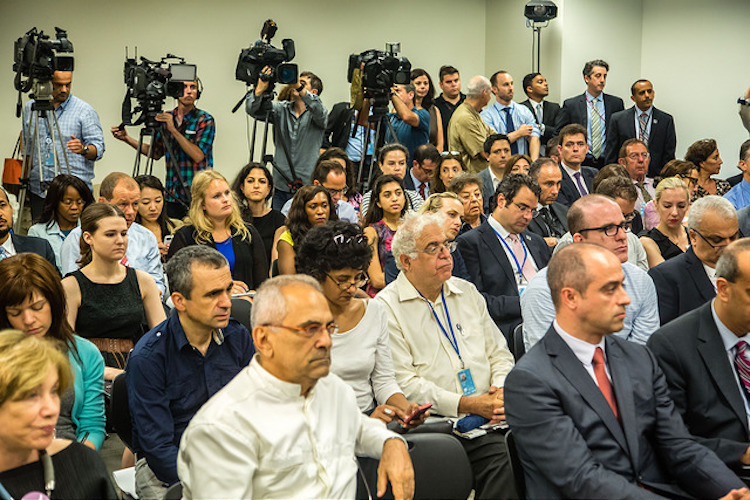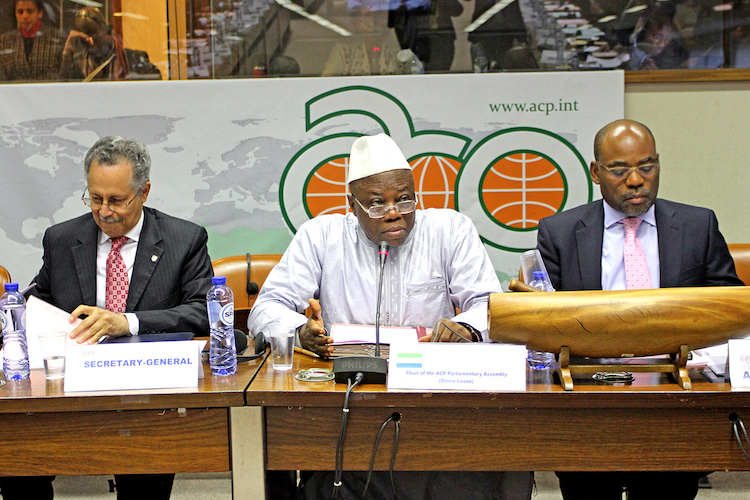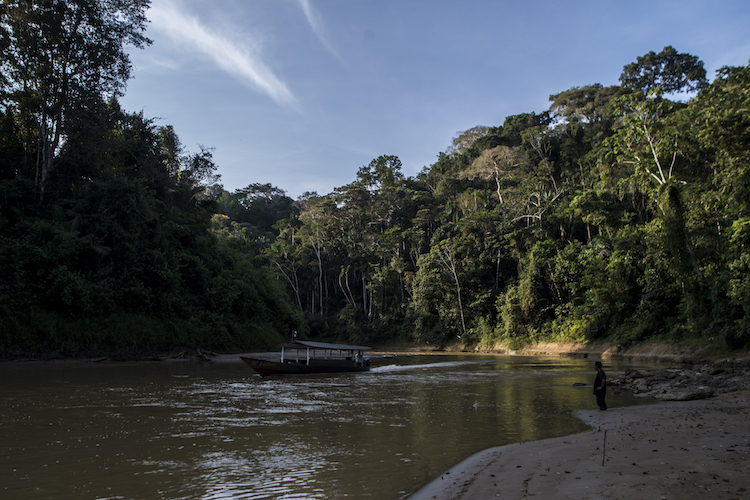By Alice Slater* NEW YORK (IDN-INPS) – NATO’s recent provocative decision to build up its military forces across Europe by sending four new multinational battalions to Lithuania, Latvia, Estonia and Poland, comes at a time of great turmoil and intense questioning of global security with new forces for both good and evil straining to make […]
Arab Media Sustains a Heavy Presence at the UN
By Shanta Roy
UNITED NATIONS (IDN) – The day-to-day news coverage by the UN press corps represents a virtual political barometer of the outside world – from a UN perspective.
Since most news organizations in the developing world cannot afford either a fulltime or a part-time correspondent at the UN, they have traditionally relied on the mainstream wire services and news organizations such as Reuters, BBC, the Associated Press, Deutsche Welle, Agence France-Presse (AFP) and the Chinese news agency Xinhua — all of them fully staffed and geared for extensive UN coverage.
What’s Going On in the Middle East?
By Pier Francesco Zarcone*
ROME (IDN) – The military breakthrough in the Syrian war appears to be definitive … at least according to Robert S. Ford, former U.S. ambassador to Syria.
Even though the conflict has not yet come to an end, in a recent interview with Foreign Affairs Ford stated that the Syrian army has won the war and the United States must “abandon hopes of supporting a separate Kurdish region” having “no good options in Syria” so that “hopes of getting rid of [Bashar Hafez al-] Assad are far-fetched fantasies.”
The reason for this situation was Russian intervention. An obvious question comes to mind: why and in what way did the Russians succeed? In this regard, it is necessary to clarify a number of points.
Milestones of the Bolshevik Revolution in Russia 100 Years Ago
By Somar Wijayadasa*
NEW YORK (IDN | INPS) – The 7th of November this year marks the centenary of the Russian Revolution – an indelible landmark and a turning point in the history of Russia – that established the Communist rule under what became the Soviet Union that is officially known as the Union of Soviet Socialist Republics (USSR). The revolution shaped world politics of the 20th century, and saved the Soviet Union from the brutal war, and propelled it to superpower status.
It is called the October Revolution as it happened on October 25 (on the old, Julian calendar), and also known as the Bolshevik (meaning majority) Revolution because it was led by Bolshevik Party leader, Vladimir Ilyich Lenin (1870-1924) – a revolutionary, politician and political theorist. The strategy for the revolution was crafted by the Russians – due to intolerable conditions resulting from centuries of serfdom under which the Russian people suffered during the Czarist autocratic rule.
ISIL Members Accused of ‘International Crimes’ in Mosul
By Jaya Ramachandran
GENEVA (IDN) – A UN report has accused the so-called Islamic State of Iraq and the Levant (ISIL/Daesh) of perpetrating serious and systematic violations in Iraq’s Mosul city that amount to “international crimes”.
Published on November 2 by the UN assistance Mission for Iraq (UNAMI) and the Office of the UN High Commissioner for Human Rights (OHCHR), the report is based on direct witness testimony, and documents mass abductions of civilians, the use of thousands as human shields, the intentional shelling of civilian residences, and indiscriminate targeting of civilians trying to flee the city.
Congressional Report Warns of Skyrocketing Costs of U.S. Nuclear Arsenal
By J C Suresh
TORONTO | WASHINGTON, D.C. (IDN) – A new study throws limelight on the skyrocketing costs of the current plan to sustain and upgrade U.S. nuclear forces and outlines several pragmatic options to maintain a credible, formidable deterrent at less cost.
The Congressional Budget Office (CBO) study published on October 31 estimates that sustaining and upgrading U.S. nuclear forces will cost taxpayers $1.24 trillion in inflation-adjusted dollars between fiscal years 2017 and 2046. When the effects of inflation are included, the CBO expects the 30-year cost to exceed $1.5 trillion. These figures are significantly higher than the previously reported estimates of roughly $1 trillion.
Donald Trump and the War Industry: Nothing Has Changed
Viewpoint by Marcelo Colussi *
GUATEMALA CITY (IDN) – During his presidential campaign, Donald Trump had the audacity (bravado? stupidity?, bad political calculation?) to ask himself if it was convenient to continue the war in Syria and tension with Russia.
The idea probably crossed his mind of putting the emphasis mainly on stimulating a sluggish domestic economy, which is gradually lowering the standard of living of ordinary American citizens.
His feverish promises to bring back industry – dislocated to other parts of the world with cheaper labour – do not appear to have gone in vain. Less than a year after his administration took over, it can be seen how U.S. foreign policy is still marked by the almighty military-industrial complex and wars continue unabated.
79 ACP Countries Keen to Remove ‘Imbalances’ in Ties with EU
By Jaya Ramachandran
BRUSSELS (IDN) – Members of Parliament from 79 African, Caribbean and Pacific (ACP) countries want a “radical departure” from the traditional relationship with the European Union (EU), which in their view has been marked by an “imbalance” between the two blocs in terms of economic might and levels of technology and capacity.
The ACP developing countries wish to achieve a level of sustainable development that enables them to progress from being dependent exporters of raw materials to being able to add value to their own products.
Cuban Youth Mastering the Art of Economic Improvisation
By Julia Rainer
TRINIDAD, Cuba (IDN) – Trinidad, one of the most popular cities in Cuba, is a place where time seems to stand still. At least that is what the thousands of tourists who come here every year from all over the world are made to believe.
Colonial cathedrals and majestic houses have been guarding the city for hundreds of years and are beautifully restored as if time had never passed. Indeed, the picturesque city – together with the marvellous surrounding sugarcane plantations – were declared UNESCO world cultural heritage in 1988.
It is part of Trinidad’s unique charm that nothing is supposed to change – a concept that can be transferred to Cuba’s tourism strategy as a whole.
Giving Visibility – and Land Rights – to the Indigenous
By Fabíola Ortiz
STOCKHOLM (IDN) – Indigenous peoples are all but invisible on the development agenda but a hoped for change is on the cards with the launch of the world’s first and only funding institution to support the efforts of local and native communities to secure rights over their lands and resources.
“Include us, so that we can protect our lands for our children and protect the planet’s biodiversity for all the world’s children,” said by Victoria Tauli-Corpuz, UN Special Rapporteur on the Rights of Indigenous Peoples during the launch. Recognising the land rights of native and traditional peoples is a low-cost solution toward achieving the world’s development, environment and climate agendas.










